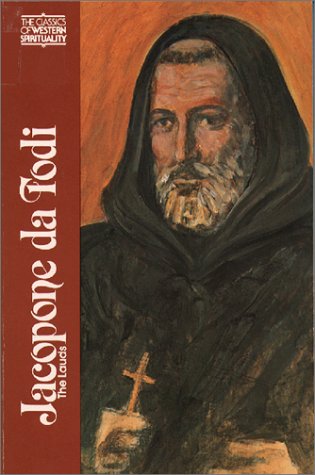Background
Few facts are known concerning the life of Jacopone da Todi. He was born circa 1236 in Todi of the noble Benedetti family.



(Jacopone da Todi (c. 1230-1306) was a Franciscan and a po...)
Jacopone da Todi (c. 1230-1306) was a Franciscan and a poet . His Lauds have long had an established place in the history of Italian poetry.
http://www.amazon.com/gp/product/0809123754/?tag=2022091-20
Few facts are known concerning the life of Jacopone da Todi. He was born circa 1236 in Todi of the noble Benedetti family.
Jacopone studied law in Bologna.
By profession he was an attorney. For 10 years he lived in seclusion as a penitent before joining the Franciscan order. At the time, the order was divided in a struggle between the Conventuals, who favored a relaxed monastic rule, and the Spirituals, who strove for strict adherence to the original rule of absolute poverty. Jacopone was a strong advocate for the latter group.
In 1294, a poor hermit, Pier da Morrone, became Pope Celestine V. Jacopone expressed his confidence in Celestine and went with a delegation to the Pope to request a special disposition for the Spirituals. The Pope granted them some autonomy within the Franciscan order as "poor hermits of Celestine. " Jacopone's laude exalting poverty may belong to this period.
Celestine V was soon succeeded by Boniface VIII (December 1294), who revoked the disposition in favor of the Spirituals. Together with other Franciscans and some prelates, particularly the cardinals Jacopo and Pietro Colonna, protectors of the Spirituals, Jacopone signed a manifesto at Lunghezza (May 10, 1297) that declared Celestine's abdication and the election of Boniface invalid. Boniface excommunicated the rebels, and Cardinal Colonna withdrew to Palestrina with his supporters, including Jacopone.
In September 1298 the papal militia occupied Palestrina, and Jacopone was imprisoned. During his imprisonment Jacopone wrote of his own wretched state, offering all his troubles to God, his "tavern keeper. " Jacopone was absolved from excommunication and released from prison by Boniface's successor, Benedict XI. He spent his last 3 years in his native Umbria at the convent of S. Lorenzo in Collazzone, where he died.
Jacopone wrote close to a hundred laude. They express his psychological and spiritual reflections, contempt for the world, horror of sin, and an impetuous love for God. His style is always energetic, sometimes crude, and starkly realistic. Many of his laude are in dialogue form; one of the most beautiful is II pianto della Madonna.
He was an early pioneer in Italian theatre, being one of the earliest scholars who dramatised gospel subjects. He wrote several laudi (songs in praise of the Lord) in Italian. The Latin poem Stabat Mater Dolorosa is often attributed to Jacopone, although this has been disputed. It is a fine example of religious lyric in the Franciscan tradition.
(Book by Peck, George T.)
(Jacopone da Todi (c. 1230-1306) was a Franciscan and a po...)
Jacopone wrote several laude on the corruption of the Franciscan order. (The sacred ballad, or lauda, was a form popularized in 13th-century Umbria by confraternities of laymen devoted to public penitence and spiritual singing. ) Another group of poems accuses the Church of corruption.
Jacopone would not recant his position on the requirement of ascetic poverty, believing that the mainstream church had become corrupt and that its ministers were not interested in the welfare of the poor. This criticism is echoed in the contemporary Alleluia Movement.
After his wife was killed, he gave up his legal practice, gave away all his possessions and from about 1268 lived as a wandering ascetic for about ten years as a Franciscan tertiary.
His wife is said to have been Vanna di Bernardino di Guidone; according to tradition she shared her husband's worldly life until she died about 1268 in the collapse of a building during a dancing feast. Jacopone found that she was wearing a hair shirt under her festive dress, and this discovery determined his conversion to a religious life.
